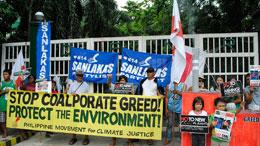On dangerous ground

On the evening of July 1, the life of Gloria Capitan, a staunch anti-coal advocate, who led community in opposing a coal storage plant project near their neighborhood in Mariveles, Bataan in the Philippines came violent end.
She was the president of Samahan ng Nagkakaisang Mamamayan ng Lucanin, a community-based organization that resisted the construction of a coal plant and open storage facility by Sea Front Shipyard Services Incorporated which is owned by Limay Bulk and Handling Terminal,
At 57 years old she was very active in the fight against coal, and even led her village last year in a series of mass actions and petitions calling for a permanent closure of the coal storage facility, a Facebook post paying her tribute said.
For a living she ran a small karaoke cantina –the very place where her life was cut short last July 1, when she was approached at shot in the neck by motorcycle riding gunmen, while her 8 year-old grandson suffered a minor injury from a stray bullet on his arm.
If this is a message to silence other anti-coal activist like her, then they are mistaken, said Val De Guzman, a campaigner for the Philippine Movement for Climate Justice, a national movement consisting of national networks/alliances and local organizations representing basic sectors, grassroots communities in the Philippines
“Because on the ground where Ate Glo’s body fell, where the blood from her body flows more anti-coal activists will sprout. Instead of silencing us, it will only strengthen our convictions, that the evil menace of coal must end. And we will persevere in this fight and see to it that our children and the children of our children will be free from it.”
Gloria Capitan’s murder was the latest death in one of the world's deadliest nations for environmental activists.
Greenpeace condemned the killing, saying it was yet another example of environmental defenders being murdered for standing up to powerful interests.
The Philippines is the second most dangerous country in the world for environment activists, with 33 killed last year, Global Witness said in a report last month.
Critics have long said that the country suffers from a "culture of impunity," where powerful figures believe they can kill opponents and critics without fear of being punished.
"[Capitan's death] seems to be really related to her work in opposing the coal storage facility in Mariveles and the expansion of coal-fired power plants in Bataan," said Reuben Muni, a climate and energy campaigner with the Philippines branch of Greenpeace.
As of 2014, coal accounted for at least 31 percent of the Philippines' power supply, according to the government's energy department.
This proportion is likely to grow as more coal-fired power plants are built to cope with the surging demand for power.
In 2015, at least 185 environmentalists and indigenous activists were murdered in 16 countries around the world, according to a new report from Global Witness, a British environmental and corruption watchdog. This number represents a 60 percent increase in murders from 2014 and is the highest number since the non-profit organization began tracking the statistic in 2002. The actual number of environmentalist and activist deaths in 2015 is likely even higher since some killings go unreported, according to the report.
“Across the world industry is pushing ever deeper into new territory, driven by consumer demand for products like timber, minerals and palm oil,” the authors write. “Increasingly communities that take a stand are finding themselves in the firing line of companies’ private security, state forces and a thriving market for contract killers. Governments must urgently intervene to stop this spiraling violence.”
In fact, Mindanao, the southernmost island in the Philippines, alone saw the murder of 25 of the 33 activists killed in that country, including a paramilitary group's public executions of the teacher Emerito Samarca, as well as Dionel Campos and Aurelio Sinzo, leaders of the indigenous Lumad people. The activists opposed large-scale mining projects in the region that aim to capitalize on the country’s massive gold, copper, nickel and coal reserves.
Brazil, however, tops Global Witness' 2015 list with 50 murders. The violence comes from ranchers, plantation owners and illegal loggers coming into conflict with environmental activists and indigenous people when they encroach on their territory.






